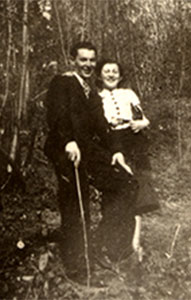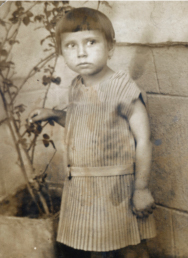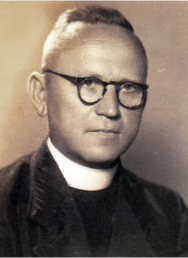
Liza Lukinskaya
Kaunas, LithuaniaInterviewed in Vilnius in 2005 by Zhanna Litinskaya
Liza Abramson (her maiden name) was born in Skaudville in 1920. Her family was lucky enough to escape into the Soviet Union once the Germans invaded Lithuania in 1941. She and her husband Ilia did not. They were herded into the Kaunas ghetto, and where, over two years, nearly all its inmates would be murdered. Very few Jews were able to escape. This is Liza’s remarkable story.
Read the biography
View the family pictures here.
“The abbess gathered all novices and told them that I was a Jew and would be in hiding there. The food would be brought into my cell and she strictly forbade everybody to say anything about me, even to their closest relatives.”
The underground members told me about a place on the free side, where I could go into hiding and they acted fast. They met a Lithuanian woman whose name was Dr Kutorgene. She was a rather elderly lady, a doctor –an ophthalmologist, who had her own practice in Kaunas. Dr Kutorgene had already saved one Jewish girl.
One of her patients was a Catholic priest, who helped her save people. That priest made arrangements in the convent to hide a Jewish lady. The only condition was for that woman had to speak very good Lithuanian and not to look typically Jewish. I met all those requirements and underground members suggested that I should leave the ghetto. I met Dr Kutorgene at a house, where I was supposed to come after my escape. At that time I wasn’t in the ghetto because I had a work permit.
Before leaving the ghetto I went to see my relatives –Uncle Abram and his wife, Aunt Liza and the rest. I said nothing of my intentions as it was just too dangerous. It was problematic to leave the ghetto at that time: police guards had been replaced by SS-security men who couldn’t be bribed. I couldn’t leave with the work detail I normally left with because the number of those coming back to the ghetto had to be the same as those who left, otherwise the whole work detail would be shot.
So my escape was prepared beforehand. First of all, I was well dressed. The cobbler made me a good pair of shoes. I looked like a true Lithuanian, not like a haggard woman imprisoned in the ghetto. There were secret places in the fence made by the underground members, where barbed wire was cut and connected by pegs. It was done in an area far from the main gate, out of sight of the guards. That manhole wasn’t checked by the Fascists who thought that it was impossible to get through there as it was coming onto a street so overgrown with weeds that it was difficult to walk through. I buried my documents in a convenient place. One of the underground members, my husband’s friend, helped me walk through, he distracted the SS-guard, took him aside, while I parted the wire and crept though the hole and dashed to the other side. This happened one evening in late May 1944.
Then I saw the work detail on their way back from work into the ghetto, so I had to hide I so nobody would recognize me and call out to me. I managed to cross the bridge and came to the center of the city, where Dr Kutorgene lived, near the Opera and Ballet theater.
I went to her office, where the patients were received, and made an appointment. When it was my turn, I entered the office. Dr Kutorgene took me to the living-room to wait. Soon her consulting hours were over and she came to me. Dr Kutorgene told me to sit at the table and we had lunch. Her son came and she introduced me to him, saying openly that I was a Jew from the ghetto.
I understood that her son was aware of her anti-Fascist activity and thought that I shouldn’t be afraid of him. But Dr Kutorgene didn’t tell her other relative, who was seeing me off at the station and buying me the train ticket to the convent, that I was a Jew. She just told him to see me off, saying that I made up my mind to become a nun. On my way, the man was trying to persuade me not to go to into the convent and that I should in this world because I was so young!
I saw a lady from my lyceum at the train station and tried to hide away, for her not to recognize me. I asked the man to buy me a train ticket. I didn’t want to attract attention by the booking office. I wasn’t frightened, on the contrary, for the first time in so many years I felt free. However, I had to be very disciplined and attentive. When I tried to get on the train, a Lithuanian guy started chatting me up. I was flirting with him, having decided that if I was of a somewhat suspicious appearance, he was beyond suspicion and it would be easier for me.
I talked the guy into going in the freight car, not in the passenger car. There were fewer people and it was dark in the freight car, so it would be difficult to distinguish me. We had been talking for a long time and I fell asleep. Suddenly I woke up hearing words spoken in Yiddish. I was speaking Yiddish in my dream. The guy was looking at me agape and I burst into laughter and said that I was learning German and spoke it in my dream.
I got off in the town of Dotnuva [about 100 km from Vilnius], the place in the closest vicinity to the convent of Saint Katrina, where I was expected. I calmly went up to the policeman at the station and asked where I could call the convent from. He took me to the director of the train station and I called the convent. I was told to wait at the station and they sent a cart to pick me up. When it arrived, it turned out that they were supposed to take me but to stop off at another place before they went to the convent. I was afraid to go with them as in that place the work detail from the ghetto was working around there and I didn’t want to be recognized. So I headed off to the convent on foot.
They were waiting for me. The abbess, Mother Prontishke, was very affable and invited me to sit at the table at once. There were well-forgotten products on the table – I had even forgotten of their existence – bananas, oranges, apples, fried chicken and fish. The abbess and the priest were sitting at the table. They started asking me about life in the ghetto. I felt really drowsy as a result of fatigue and tension since my escape from the ghetto. I begged them pardon me and said that I was really sleepy. The abbess took me to a room with three bunks. She tucked me into bed and said that I shouldn’t get up in the morning when the girls would be going to pray as I should rest as much as I wanted.
In the evening, when the girls came back from work, I was still asleep. Early the next morning, the bell rang calling for prayer. One of the girls came up to me, kissed me on the cheek and calmly invited me for a prayer. I explained to her that the abbess allowed me not to pray today. After that nobody addressed the issue of my praying. That’s because the abbess gathered all novices and told them that I was a Jew and would be in hiding there. The food would be brought into my cell and she strictly forbade everybody to say anything about me, even to their closest relatives.
I stayed in the convent until the arrival of the Soviet troops. I rarely left my cell. I started knitting to kill time. The girls brought me yarn. Of course, it was sad to stay in almost all the time and I took walks in the convent garden. It was the season when the berries ripened: currant, strawberries. I enjoyed eating them straight from the bushes. Sometimes I went to the cathedral by the convent. I sat in the last pew so that the parishioners wouldn’t see me – people from local villages came to the cathedral – and I listened to the Catholic mass.
BULLYING STORIES

“It’s something that never leaves you. It’s something you never forget, no matter how long you live.”
STANDING UP STORIES

“The priest gave me a Christian name for my false papers. I’ve kept it ever since because he didn’t just give me a name, he gave me a life.”